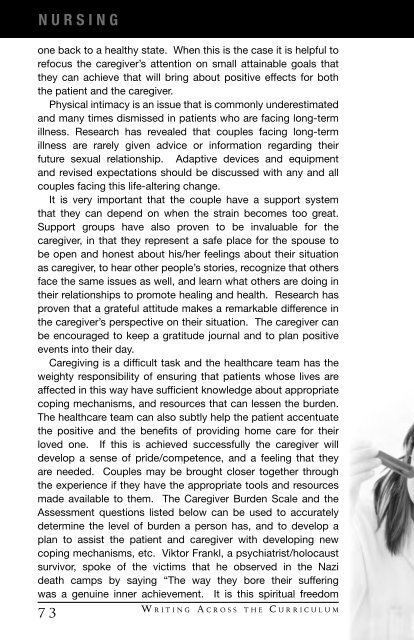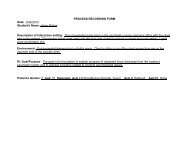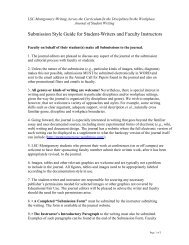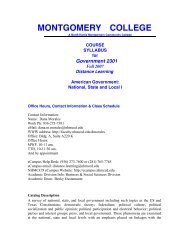2008 - Communication Across the Curriculum (CAC)
2008 - Communication Across the Curriculum (CAC)
2008 - Communication Across the Curriculum (CAC)
You also want an ePaper? Increase the reach of your titles
YUMPU automatically turns print PDFs into web optimized ePapers that Google loves.
N u r s i n g<br />
one back to a healthy state. When this is <strong>the</strong> case it is helpful to<br />
refocus <strong>the</strong> caregiver’s attention on small attainable goals that<br />
<strong>the</strong>y can achieve that will bring about positive effects for both<br />
<strong>the</strong> patient and <strong>the</strong> caregiver.<br />
Physical intimacy is an issue that is commonly underestimated<br />
and many times dismissed in patients who are facing long-term<br />
illness. Research has revealed that couples facing long-term<br />
illness are rarely given advice or information regarding <strong>the</strong>ir<br />
future sexual relationship. Adaptive devices and equipment<br />
and revised expectations should be discussed with any and all<br />
couples facing this life-altering change.<br />
It is very important that <strong>the</strong> couple have a support system<br />
that <strong>the</strong>y can depend on when <strong>the</strong> strain becomes too great.<br />
Support groups have also proven to be invaluable for <strong>the</strong><br />
caregiver, in that <strong>the</strong>y represent a safe place for <strong>the</strong> spouse to<br />
be open and honest about his/her feelings about <strong>the</strong>ir situation<br />
as caregiver, to hear o<strong>the</strong>r people’s stories, recognize that o<strong>the</strong>rs<br />
face <strong>the</strong> same issues as well, and learn what o<strong>the</strong>rs are doing in<br />
<strong>the</strong>ir relationships to promote healing and health. Research has<br />
proven that a grateful attitude makes a remarkable difference in<br />
<strong>the</strong> caregiver’s perspective on <strong>the</strong>ir situation. The caregiver can<br />
be encouraged to keep a gratitude journal and to plan positive<br />
events into <strong>the</strong>ir day.<br />
Caregiving is a difficult task and <strong>the</strong> healthcare team has <strong>the</strong><br />
weighty responsibility of ensuring that patients whose lives are<br />
affected in this way have sufficient knowledge about appropriate<br />
coping mechanisms, and resources that can lessen <strong>the</strong> burden.<br />
The healthcare team can also subtly help <strong>the</strong> patient accentuate<br />
<strong>the</strong> positive and <strong>the</strong> benefits of providing home care for <strong>the</strong>ir<br />
loved one. If this is achieved successfully <strong>the</strong> caregiver will<br />
develop a sense of pride/competence, and a feeling that <strong>the</strong>y<br />
are needed. Couples may be brought closer toge<strong>the</strong>r through<br />
<strong>the</strong> experience if <strong>the</strong>y have <strong>the</strong> appropriate tools and resources<br />
made available to <strong>the</strong>m. The Caregiver Burden Scale and <strong>the</strong><br />
Assessment questions listed below can be used to accurately<br />
determine <strong>the</strong> level of burden a person has, and to develop a<br />
plan to assist <strong>the</strong> patient and caregiver with developing new<br />
coping mechanisms, etc. Viktor Frankl, a psychiatrist/holocaust<br />
survivor, spoke of <strong>the</strong> victims that he observed in <strong>the</strong> Nazi<br />
death camps by saying “The way <strong>the</strong>y bore <strong>the</strong>ir suffering<br />
was a genuine inner achievement. It is this spiritual freedom<br />
7 3<br />
W r i t i n g A c r o s s t h e C u r r i c u l u m






